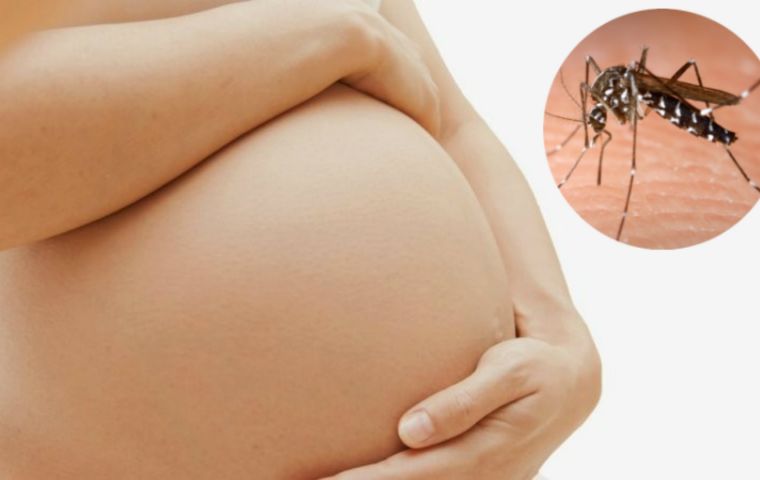MercoPress. South Atlantic News Agency
WHO public health advice regarding the Olympics and Zika virus
 WHO advises pregnant women not to travel to areas with ongoing Zika virus transmission.
WHO advises pregnant women not to travel to areas with ongoing Zika virus transmission.  During the day protect from mosquito bites by using insect repellents and wearing clothing – preferably light-colored – that covers as much of the body as possible.
During the day protect from mosquito bites by using insect repellents and wearing clothing – preferably light-colored – that covers as much of the body as possible.  Book air-conditioned accommodation (windows and doors are usually kept closed to prevent the cool air from escaping, and mosquitoes cannot enter the rooms).
Book air-conditioned accommodation (windows and doors are usually kept closed to prevent the cool air from escaping, and mosquitoes cannot enter the rooms). Based on current assessment, cancelling or changing the location of the 2016 Olympics will not significantly alter the international spread of Zika virus. Brazil is one of almost 60 countries and territories which to-date report continuing transmission of Zika by mosquitoes. People continue to travel between these countries and territories for a variety of reasons. The best way to reduce risk of disease is to follow public health travel advice.
WHO advises pregnant women not to travel to areas with ongoing Zika virus transmission. This includes Rio de Janeiro. Pregnant women’s sex partners returning from areas with circulating virus should be counseled to practice safer sex or abstain throughout the pregnancy.
Anyone considering travel to the Olympics should;
• follow the travel advice provided by their countries’ health authorities, and consult a health worker before travelling.
• whenever possible, during the day, protect themselves from mosquito bites by using insect repellents and by wearing clothing – preferably light-colored – that covers as much of the body as possible.
• practice safer sex (e.g. use condoms correctly and consistently) or abstain from sex during their stay and for at least 4 weeks after their return, particularly if they have had or are experiencing symptoms of Zika virus.
• choose air-conditioned accommodation (windows and doors are usually kept closed to prevent the cool air from escaping, and mosquitoes cannot enter the rooms).
• avoid visiting areas in cities and towns with no piped water and poor sanitation (ideal breeding grounds of mosquitoes) where the risk of being bitten is higher.
WHO/PAHO is providing public health advice to the Government of Brazil and the Rio 2016 Organizing Committee, on ways to further mitigate the risk of athletes and visitors contracting Zika virus during the Games. An important focus of WHO advice revolves around measures to reduce populations of Aedes mosquitoes which transmit chikungunya, dengue and yellow fever in addition to Zika virus.
Based on the current assessment of Zika virus circulating in almost 60 countries globally and 39 in the Americas, there is no public health justification for postponing or cancelling the games. WHO will continue to monitor the situation and update our advice as necessary.
For additional travel assessments from other public health agencies see:
U.S. Centers for Disease Control and Prevention assessment published May 26, 2016: http://wwwcdc.gov/media/releases/2016/t0526-npc.html




Top Comments
Disclaimer & comment rules-

-

-

Read all commentsThe advice is....don't get bitten buy a mosquito. I would say that is practically impossible. I have been in the tropics several times and followed the advice about clothing, using deet but still managed to get bitten by something.
May 28th, 2016 - 11:31 am 0They forgot to mention that during the winter in the Southeast mosquitoes do not survive the temperature and climate.
May 28th, 2016 - 12:37 pm 0Below 22º Celsius has no mosquitoes.
Only zombies!
https://www.youtube.com/watch?v=6Ejga4kJUts&list=FLmXPTu1f8AdGlizWNiASx2A&index=3
#2
May 28th, 2016 - 04:51 pm 0BUT many people are going to visit other parts of Brasil as well as the games.
I would believe the WHO warning. There will be a risk, how much nobody knows.
I looked at the average temperatures for Rio in August...highest 28° lowest 18°
Mosquitos can bite below 18°C. as I found out reading...or trying to read...
http://www.ncbi.nlm.nih.gov/pmc/articles/PMC3828393/
Commenting for this story is now closed.
If you have a Facebook account, become a fan and comment on our Facebook Page!